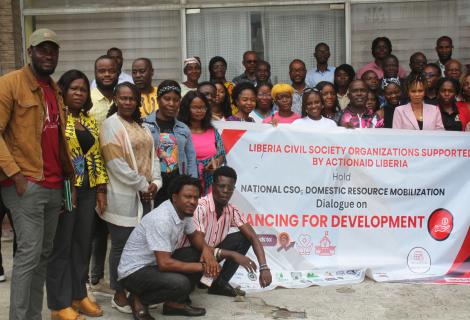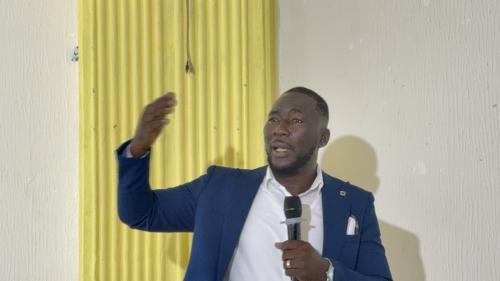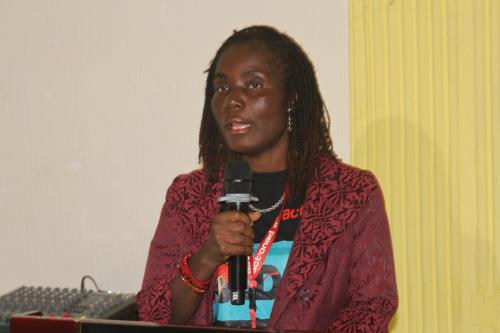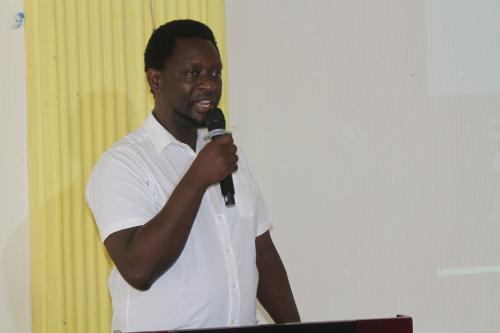Liberian Civil Societies and ActionAid Liberia want government cut down on external credits and invests in social services to transform Liberia ahead of FFD4 Conference

National CSOs Domestic Resource Mobilization Dialogue on Financing For Development
Liberia currently owes around US $2.5 billion in external debt. Each year, 16–17% of the country’s national budget goes toward debt servicing, leaving very little for essential services like health care, education, and roads.
At the National CSOs Domestic Resource Mobilization Dialogue on Financing for Development, held by civil society organizations and supported by ActionAid Liberia, Harold Aidoo, Executive Director of Integrity Watch Liberia, Action Aid Liberia’s Country Director, and other leading civil society organizations in the country highlighted the deeper issue of national financing, debts, and taxes.
About 80 to 81% of Liberia’s national budget is spent on salaries, new vehicles, and fuel. With spending like this, there's little room to invest in real change for ordinary Liberians CSO leaders stressed calling for a robust change in Liberia’s fiscal management and calling on civil society organizations to engage in a more informed advocacy by engaging state actors on ways the governments can transition to a people-centered budget.
Unless Liberia rethink how it manages public finances, CSOs leaders said Liberia will remain stuck in the cycles of poverty and poor governance. It’s time for bold action and true investment in Liberia’s future they emphasiezed.
“Every year, Liberia spends an average of 16 to 17 percent of our national budget to service our debts, so the actual money that is left to spend on basic social services like health care, education, and roads, is nothing much.” Integrity Watch Liberia’s executive director Harold Aidoo said during his presentation.

The National CSOs Domestic Resource Mobilization Dialogue which brought together about one hundred CSO leaders, was aimed at taking a deeper review of the future of financing for development and at the same time seizing the opportunities created by aid cuts and the mounting debt crisis, to demand system change nationally and internationally.
This national CSOs dialogue comes just at the time Liberia is gearing up to join other countries of the world for the 4th International Conference on Financing for Development in Sevilla, Spain from June 30 to July 3, 2025.
The Fourth International Conference on Financing for Development (FFD4) provides the opportunity to reform financing at all levels, including to support reform of the international financial architecture and addressing financing challenges preventing the urgently needed investment push for the Sustainable Development Goals (SDGs).
The dialogue brought together civil society allies, trade unions, women, and youth movements, advocates, and key decision makers in the NGO sectors around the table to talk about the critical issues of economic justice, climate justice and women’s rights work and at the same time analyzing the urgent need for national fiscal change in a way that national governments are proactive in shaping the future by its fiscal policies to improve the lives of Liberians and cut down on external credit.

On top of this, austerity and rising debt are crippling public services. Liberia now spends more on debt than on health and education combined and it is deepening poverty and burdening women and girls.
Speaking at the national dialogue, ActionAid Liberia’s Country Director, Madam Elizabeth Gbah Johnson called for urgent reforms and systemic alternatives aimed at adding that the root of the crisis should not be ignored.
She continued, “Here in Liberia, we are navigating a Deeping debt crisis. Our government is being forced to cut domestic spending on essential public services, health, education and social protection just to meet repayment obligation to wealthy creditors, we cannot ignore the root of this crisis”
She used the occasion to call for collective actions describing the national dialogue as a movement to demand for bold change, reject austerity, resist illicit financial flows, and reclaim Liberia’s future, where governments will finance national programs by putting money to critical infrastructures to better the lives of Liberian citizens.
“Today we unit to co-create bold national demands that will advance gender-responsive public services and increase national accountability over public spending to reduce corruption to rebuild public confidence. And we also demand an end to illicit financial flows that are continuing to drain resources”
On June 11, 2025 we officially launched our latest research study: The Human Cost of Public Sector Cuts in Africa. The report draws on testimonies from over 600 healthcare workers, teachers, and community members across Liberia Ethiopia, Kenya, Nigeria, Malawi, and Ghana, Nigeria, exposing how public spending cuts in healthcare and education are undermining essential services, with devastating consequences for frontline workers and communities, especially women and girls.

Touching on the findings from healthcare, Kuphanga said of the surveyed communities and healthcare workers, 51% of healthcare workers reported significant increase in healthcare costs, particularly in medicine costs. While 98% of healthcare workers in surveyed also reported inadequate pay with a decline of up to 30% in the last 3 to 5 years citied from “The High Human Cost of Public Sector Cuts in Africa” Research conducted by ActionAid.
The National CSOs Domestic Resource Mobilization on Financing for Development is aimed at uniting civil society, feminists, youth movements, and government actors to co-create bold national demands on: Climate justice and extractive reform, Debt relief and tax justice and Gender-responsive public services.
In attendance at the dialogue were CSO leaders from the National Civil Society Council of Liberia, the Women NGO Secretariat of Liberia, Center for Transparency and Accountability (CENTAL), CSO Budget Platform, CSO Tax Justice Working Group, Medica Liberia, Informal Working Group on SRHR/RFSU, Fiscal Transparency Advisory Group, Liberia women Human rights Defenders, and the National Climate Change NGO Coalition.
Other institutions present at the dialogue were; Federation of Liberian Youth, MAP Liberia Land Platform, National Alliance of Climate & Environment NGOs of Liberia, Liberia Biodiversity Youth Network, Liberia Coalition of Human Rights Defenders, and Consortiums of Indigenous People and Local Communities among others.